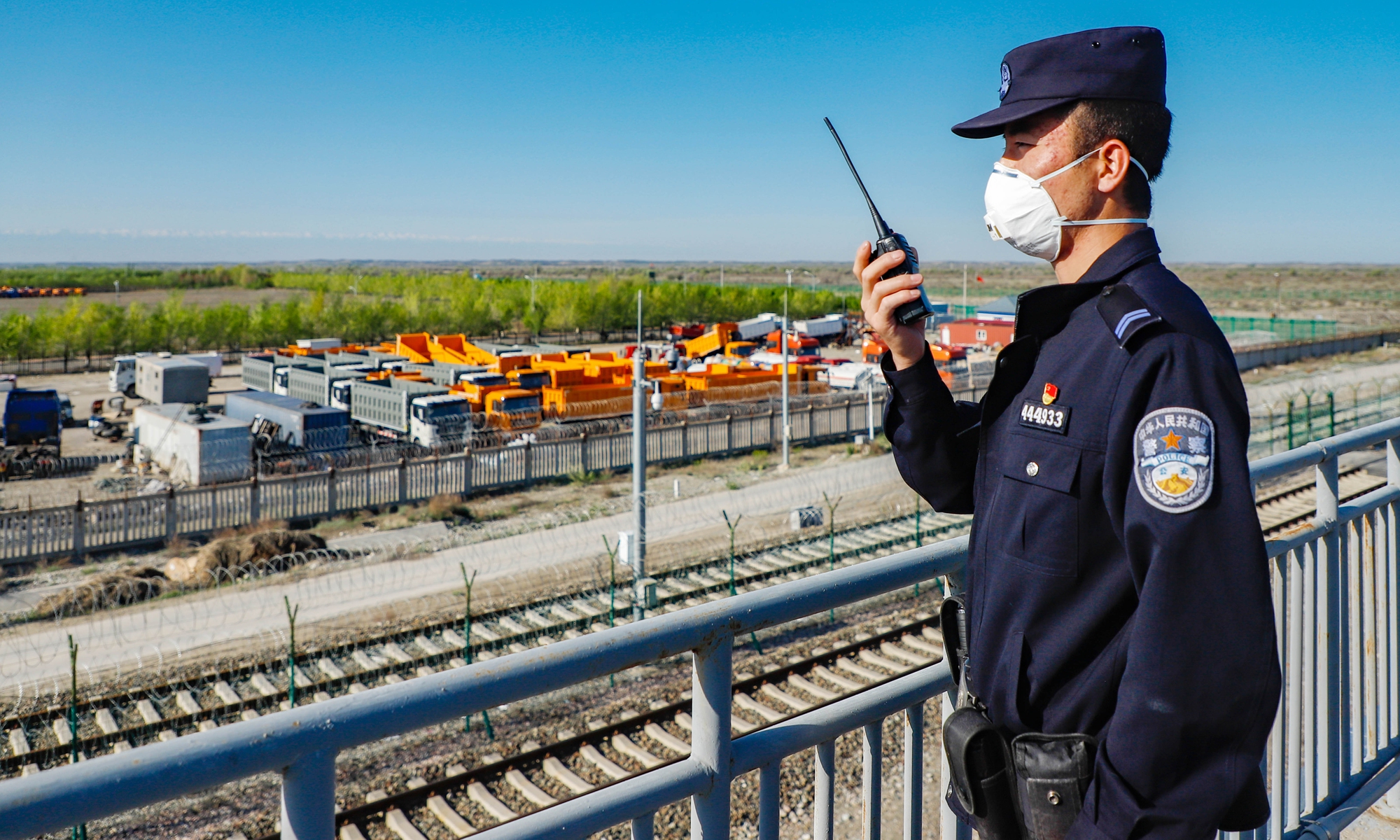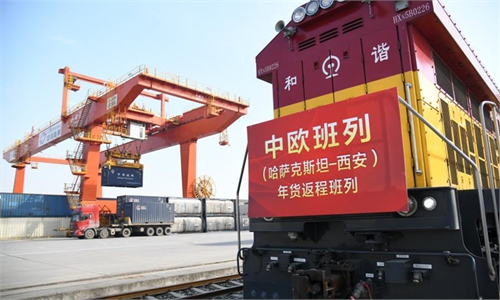Kazakhstan, China to seek solutions to delayed trade at border
B&R assisting economic recovery

A police officer checks pandemic prevention situation at Khorgos inland port in Northwest China's Xinjiang Uygur Autonomous Region in April, 2020. Photo: VCG
Editor's Note:A recent video report by Bloomberg tried to address question of whether a massive new land port on China-Kazakhstan border will help prop up trade bracing some reported negative factors. And an article in the Diplomat magazine expresses concerns over trade efficiency citing a bottleneck on that border, has left thousands of wagons waiting against the backdrop of the pandemic. However, Gulnar Shaimergenova (GS), director of China Studies Center, Kazakhstan, recently shared her insights with Global Times (GT) about significance of the Belt and Road Initiative (BRI) in the long run.
GT: How do you evaluate bilateral cooperation and outlook against the backdrop of the coronavirus onslaught and trade protectionism?
GS: Kazakhstan and China continue to develop stronger bilateral relations. I am sure that the pandemic has only demonstrated how important we are to each other. We have seen that we are not only good and responsible neighbors, but also important business partners.
Trade protectionism by some countries, of course, has had an impact on the development of cooperation, but I am sure that the 138 countries and 31 international organizations that participate in the BRI can create a particularly profitable and benign international environment.
Over the years of implementation of the Belt and Road, trade has grown by more than 30%. In 2020, despite the pandemic, the trade figure increased by further 1.5%. This may indicate that the BRI can lead to the recovery and development of the global economy after virus attack. And this is based on friendly cooperation between Kazakhstan and China.
GT: Does the "build and demand will come" concept ill-advocated by Bloomberg make sense? Why?
GS: Appetite comes with eating - as the saying goes. We can also project certain issues, for example, the construction of transport and logistics infrastructure. It is clear that when the BRI was only a topic for discussion in 2013-2014, few people saw the prospects for the development of trade and many infrastructure projects far beyond the borders of their country.
When the new railway got through in 2015, many people were able to assess its ability to use the new rail infrastructure for expanding trade and ram up economic activity in the newly opened-up markets.
Today, there are no qualms about the effectiveness of the land port links between the East and West. Our countries have actually shown that shortening the delivery time of goods by 3-4 times is beneficial for everyone.
As a result, countries and corporations are now discussing joint production and technological projects. This is a new and high level of cooperation. Therefore, I agree that the "build and demand will come" approach in our case of the construction of the BRI works well, and demonstrates the result.
GT: How do you evaluate the so-called bottleneck when it comes to trade on the Kazakh-China border? Will it impede bilateral/multilateral cooperation?
GS: I think that the current trade slackness on the Kazakh-Chinese border is temporary. It is associated with the pandemic and the induced negativity on all business processes. And, I am quire sure that Kazakhstan and China will be able to successfully resolve it.
What is my confidence based on? First of all, it is based on the fact that there was no such slackness at the port before the pandemic. Therefore, this situation, as I have already said, is caused by the pandemic.
Our countries have an ongoing inter-government dialogue. And the most important thing is that both Kazakhstan and China are striving to resolve the existing delays in transport services. The governments of both countries are engaged in a productive dialogue and a solution will be found.
GT: A total of 100 China-made buses used for medical testing were delivered to Kazakhstan in late January, in an attempt to boost access to fast and convenient medical services. How do you observe China-Kazakhstan cooperation in the medical sector?
GS: The medical sector is a strategically important area of cooperation, and relations between Kazakhstan and China also take into account this promising direction. Vaccination, production of vaccines and joint biological research can become significant issues on the bilateral agenda of relations between Kazakhstan and China.
In addition, Kazakhstan fully supports the initiative of China to build the "Silk Road of Health" - an important idea for the security of all of Eurasia.
According to media reports, Some Western countries have focused mainly on their domestic COVID-19 control affairs and the developing countries have found themselves face-to-face with the pandemic and the economic crisis. China offers good coordination on vaccines and related health issues to deal with this challenge in the 21st century.
China offers to share experience in tackling diseases, helps train doctors, provides humanitarian assistance and shares its vaccines. Kazakhstan shares such value - we also provide humanitarian assistance to the extent possible and are interested in ensuring that all countries have the opportunity to receive vaccines. Kazakhstan and China will expand our medical cooperation because it is beneficial for everyone.

